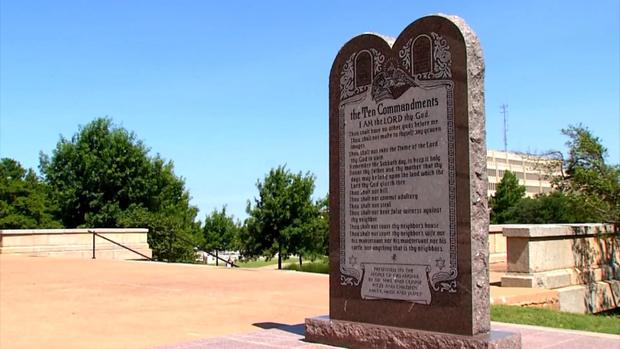Appeal Heard In Dispute Over Ten Commandments Monument
DENVER (AP) - A New Mexico municipality that wants to keep a 6-foot-tall Ten Commandments monument outside City Hall told a federal appeals court Wednesday that the structure is not government speech because it was privately funded.
The city of Bloomfield is fighting a lawsuit filed by two residents who practice the Wiccan religion and contend the monument amounts to the government endorsing a particular faith. Last year, a federal judge in New Mexico agreed and ordered the removal of the monument, saying it violates a constitutional ban on using public property to support specific religions.
That order is on hold pending the city's appeal to the 10th Circuit Court of Appeals in Denver. A ruling can take weeks, possibly months.
The attorney representing Bloomfield argues the city has allowed equal access for residents to construct and pay for historical monuments on the City Hall lawn. The monuments are governed under a 2007 city policy that says the structures will be privately funded and do not reflect a particular view of Bloomfield's officials, said Jonathan Scruggs, an attorney for the Christian advocacy group Alliance Defending Freedom.
"This is not a religious conspiracy," he said.
The Ten Commandments monument was the first to go up on July 2011. A monument on the Declaration of Independence followed months later, then one on the Gettysburg address in 2012, and then one on the Bill of Rights last year.
The American Civil Liberties Union, which filed the lawsuit on behalf of the two Bloomfield residents, argues the other monuments on display and the policy the city adopted do not justify the Ten Commandments structure on government property.
Andrew Schultz, an attorney working with the ACLU, told the three-judge appeals court panel hearing the case that Bloomfield officials first authorized the Ten Commandments monument before adopting the policy governing the displays after residents complained.
"We believe the policy was passed after the city had already taken the impermissible step of authorizing the placement of the Ten Commandments monument to stand by itself at the front of the City Hall lawn," Schultz said. The policy was used to "rationalize what they had already done," he said.
Scruggs repeatedly told judges the monuments reflect the private speech of individuals, not the government.
"They don't speak for the city. They speak for the private parties who put it up," he said after the hearing. Each monument has a disclaimer next to it making that point, Scruggs said.
In Oklahoma, a Ten Commandments monument outside the Capitol is in the process of being removed after the state's Supreme Court ruled in June that it violated a state constitutional prohibition on using public property to support a religion.
- By Ivan Moreno, AP Writer
(© Copyright 2015 The Associated Press. All Rights Reserved. This material may not be published, broadcast, rewritten or redistributed.)




